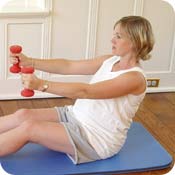 It is no secret that breastfeeding is the best nutritional choice for babies. And while it is the most natural way to feed your baby, it doesn't always come naturally to moms! Here are some tips to ease breastfeeding for you and your baby.
It is no secret that breastfeeding is the best nutritional choice for babies. And while it is the most natural way to feed your baby, it doesn't always come naturally to moms! Here are some tips to ease breastfeeding for you and your baby. Do your research. A common mistake first-time moms make is not doing their research. Start early--invest some time in learning how to breastfeed before you bring your baby home. There are books, magazines, websites and many other valuable resources available to help you get acquainted with the topic. You don't have much time to prepare, and it's never too soon to get started. Lactation consultants. As you near the end of your pregnancy, notify your health-care provider of your plans to breastfeed. She can provide you with some basic literature and contact information for a lactation consultant. If you are undecided on breastfeeding, the lactation consultant might sway you, as she can also share information about resources such as lactation classes and support groups. Once you make your decision, tell your doctor so the hospital can have a consultant ready to help you get started. La Leche League International is also a great resource throughout your breastfeeding experience. Find a breastfeeding expert in your area using the LLL leader index. LLL representatives provide support and answers to your specific question free of charge. Timing is everything. The sooner you get started, the better. Some experts suggest nursing the moment you deliver. Others suggest waiting until mom and baby have had time to rest. However, labor is physically exhausting, and only you know your limits--breastfeeding is most beneficial to both you and your baby when you are relaxed and ready. Otherwise, your baby could respond negatively to your attempts, so do what works best for you. Make it clear to you health-care provider and hospital/birthing-center staff that you intend to brestfeed before, during and after delivery. If you are in a hospital setting, nurses and staff change over multiple times, do not hesitate repeating your wishes to each care-provider. Getting a head-start on nursing is recommended for several reasons. Your baby has survived off the nutrients passed through the umbilical cord for months, and those nutrients are designed to sustain her for some time after delivery. Because she is still satiated from the womb, she may show little interest in nursing. Allowing her early and frequent occasions to nurse will only improve your chances for breastfeeding success- when she finally is hungry, she'll know just what to do! Practice benefits you, too. Your body is new to breastfeeding and will need the stimulation of your nursing baby to jump-start milk production. A pump will surely express milk from your breasts but not like your baby--her technique is Mother Nature's most effective design. The more she nurses, the more your body will produce in order to keep up with her demands. Pumping (or hand expressing) a small amount of milk may help your newborn latch on if your breasts are engoerged (very full). When breasts are engorged they can be too tight for a newborn to latch. Know your obstacles. Your baby is born with the instinct to suck, swallow, and breathe (in that order), and a reflex to open her mouth in search of food. But she isn't used to feeling hungry or using her mouth to eat. Because breastfeeding can be tricky, remove unnecessary obstacles that may impede success--starting at the hospital. Babies are creatures of habit, so consistency is crucial in learning a new skill. Newborns often soothe themselves by suckling, and research suggests that switching frequently from breast to bottle nipples or pacifiers may confuse them. To nurse, your baby must open her mouth much wider than when sucking on a pacifier in order to get the most out of a feeding. She must fit your entire nipple into her mouth, with the tip reaching the back of her throat--this maximizes suction and increases milk flow, while minimizing discomfort to you. Your baby's tongue should be engaged in the latch, not curled up in the back of her mouth. This maneuver makes all the difference when she is learning to "latch on" and any nipple confusion could prove frustrating for both of you. Not all babies experience this, but eliminating the option altogether might be wise. If your baby is restless and wanting to suckle, hold off on the pacifier for awhile and offer your breast instead. Nursery "supplements" (formula or water given from a bottle) can also deter your progress. Many mothers ask that their babies be brought to their room to nurse whenever they are hungry or need soothed. Your infant eats every two to three hours but will be reluctant to nurse if her belly is full from a supplement feeding. Also, the less often she nurses from your breasts, the less sustenance your body will deem necessary to produce, thus thinning your supply. Getting started. Your baby is born with what is called a "rooting" reflex. Instinctively, she will open her mouth and move her head back and forth to signal she is hungry. You can stimulate this reflex by gently caressing her cheek with your finger--whichever side you rub is the direction she will turn. Another technique to try is to run the tip of your nipple around your baby's lips--the gentle stimulation is sure to get her attention. Remember, she needs to be able to fit your whole nipple (or as much as she can) into her mouth, and the wider she opens up, the better "latch" she'll get. Once her mouth is open, cup your breast between your thumb and fingers, and guide your nipple towards the back of her mouth. If you can, stroke the roof of her mouth with the tip of your nipple--this will stimulate her sucking reflex, causing her to close her mouth around your nipple. Once she has a comfortable grip and begins to suck, she is "latched on." This may take a few tries, so be patient--this is new for the both of you. Some initial discomfort is normal, but if you are in pain, or if she slips off or is hesitant to close her mouth around your nipple, hook your finger around the corner of her mouth to release suction and start over. Put your best foot forward. Nurses and lactation consultants have been at your disposal during your hospital stay, but once you're home, it's up to you to continue to apply what you've learned to achieve breastfeeding success. Your milk should "drop" (or "come in") any day now, and it is important that you take proper care of yourself to ensure your supply keeps up with your baby's demands. It is recommended that nursing moms amp up their diet by consuming an extra 600 calories per day (300 caloies above your pregnancy range). Two extra snacks a day (such as a cup of low-fat cottage cheese and a medium size peach or apple, and a handful of peanuts or cashews and a cup of low-fat yogurt) will easily compensate for the increased nutritional needs. Nursing burns a lot of calories, and not making up for the loss can quickly diminish a mother's milk supply (and energy) no matter how often you nurse. Continue to take your prenatal vitamins, drink plenty of fluids (water and juices are best) and get some rest. This will help keep exhaustion at bay and your milk supply up. Oldies but goodies--more tricks for success. The milk ducts in your breasts react well to stimulation. Try massaging your breasts, starting at the top and working your way down toward the nipple. Use firm but gentle pressure--never squeeze, as this can bruise delicate and swollen tissue. While your baby is nursing on one breast, massage the other with your free hand. Let her nurse on one side for at least 10 minutes, and then switch her to the other--favoring one side can decrease milk production in the neglected breast and cause overproduction in the one she prefers. This overproduction can also clog milk ducts. Heat is another good stimulant. Before nursing, apply hot compresses to your breasts--washcloths work well because they can wrap around the whole breast. Wet them in warm to hot water and apply them to your chest. The heat will relax the tissue, releasing your milk. You can repeat this process as often as necessary until your milk drops. Most importantly, always make sure you are relaxed and comfortable. Find a quiet place in your home and make it your regular spot to nurse. Your baby will begin to recognize that when she is in the "nursing chair," it is time to eat. Bring with you something to sip on to keep hydrated throughout the feeding. Get comfortable by placing a nursing pillow around your waist to support your arms, and lower the lights or turn on some relaxing music if needed. Remember, nursing is more than just meal time for your baby, but a special opportunity for the two of you to bond, so get cozy and make the most of it. Get support. It's easy to get discouraged or frustrated if you're having trouble nursing. But remember that breastfeeding takes practice, and experiencing difficulty is actually very common. Lean on other moms with similar experiences for support and encouragement, and be open and honest about your setbacks. Most importantly, cut yourself some slack; you don't have to be a nursing champion to be a good mom. If you cannot continue to nurse--for whatever reason--anything you've been able to give to your baby is better than nothing at all. The main thing is that she continues to get proper nutrition, and switching to formula does not signal failure. Feelings of guilt or worthlessness will only steal the pride in all you've accomplished. Good luck, and start nursing, Moms! |
Breastfeeding: Strategies for Success
Tips and Tricks to Ease Nursing for You and Baby
Page 1 of 1





Member Comments